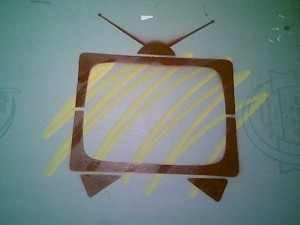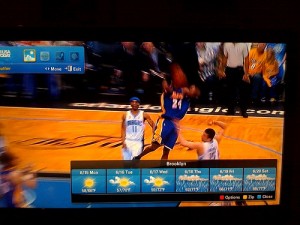 Watching sports on television is an inherently social experience. Typically, fans watch televised games together, and when they don’t, they tend to text or chat while watching. More and more, fans hang out on social media platforms during games, treating their team’s Facebook page, for example, as a chat room. Why then, is the encouragement of fan interaction, through social media or other outlets, not a bigger part of sports broadcasts?
Watching sports on television is an inherently social experience. Typically, fans watch televised games together, and when they don’t, they tend to text or chat while watching. More and more, fans hang out on social media platforms during games, treating their team’s Facebook page, for example, as a chat room. Why then, is the encouragement of fan interaction, through social media or other outlets, not a bigger part of sports broadcasts?
There are many ways to incorporate social media into televised sports. For example:
- “Ask the Announcer” Segment. Invite fans & followers to take part in “Ask the Announcer” segments, which typically appear in both locally and nationally-televised sporting events. Take submissions through the network’s social accounts as well as from the accounts of the teams that are playing.
- Show fan & follower comments as they come in. Obviously this can’t be 100% real-time because of the occasional need to censor unnecessary/inappropriate messages, but it would be really cool if fan & follower comments were displayed on-screen throughout the broadcast.
- Display social media links as much as possible. There is typically a ton of space on-screen during a broadcast. Would be a good idea to rotate social media links in unused space. Obviously, the links displayed would be dependent on whether the broadcast was local (e.g. just home team and network) or national (e.g. both teams, maybe the league, and the network).
- Feature player profiles when highlighting them in-game. When highlighting an individual player (e.g. showing stats or key plays), throw in a link to his or her Facebook page or Twitter profile. If he or she doesn’t have one, oh well. But why not reward athletes who choose to brand themselves through social media?
Obviously, there are a lot of differences between a local broadcast and a national broadcast. With local broadcasts, it makes sense for the network to promote their team’s social media accounts and vice versa. More television viewers to team social accounts means more eyeballs when the team cross-promotes the network’s social media accounts.
 With national broadcasts, the league gets involved, and there are more complications because of inequality in scheduling (e.g. the Buffalo Bills aren’t getting as many Monday Night Football appearances as the Pittsburgh Steelers). However, there are still exciting opportunities to incorporate social media there. In fact, the potential impact of including social media in a national broadcast is obviously higher than a local broadcast, simply because of sheer viewership numbers.
With national broadcasts, the league gets involved, and there are more complications because of inequality in scheduling (e.g. the Buffalo Bills aren’t getting as many Monday Night Football appearances as the Pittsburgh Steelers). However, there are still exciting opportunities to incorporate social media there. In fact, the potential impact of including social media in a national broadcast is obviously higher than a local broadcast, simply because of sheer viewership numbers.
What’s also fun to think are Smart TV’s. As televisions become inherently more and more advanced technologically, and as the web becomes more and more a part of the TV-viewing experience, imagine how much social media could enhance watching sports. For example, millions of people watched the inauguration on CNN.com and utilized Facebook Connect to update their statuses and see what their friends were saying as they watched. Pretty soon, that experience will take place on your TV instead of on the web, definitely during sports broadcasts.
To conclude, I’ll start with how I began: Watching sports on television is an inherently social experience. It’s only a matter of time before social media becomes a part of the typical sports watching experience. We’re already seeing some of this in 2010. Just wait for 2012.
What do you think? How long before we’re seeing social media integrated into the sports-watching experience? What do you think would be the best integrations of social and televised sports? As always, would love to hear your comments below!
###
Image by *USB*
Image by dpstyles


Great stuff Sam, lots of opportunity for social media tie-ins. I’ve been saying for over a year that sports with frequent stoppages, such as football and baseball, should incorporate fan submissions to the announcers/commentators.
@ChrisRav
The key reason that more social media isn’t incorporated is the thought that digital and social are different animals than television or print. While we do see more incorporation with broadcasts like “Mike and Mike” and some of the more local networks (NESN in the Boston area), the overall view is not about integration. This surprises me as that type of thinking has already been remedied in much of CPG and mainstream business. The key to successful fan engagement isn’t about just the game anymore; it’s about the engagement of the fan/audience in addition to the event itself.
If you’re looking for a good example take a look at what the Pittsburgh Penguins are doing with their new media/digital efforts. Downloadable game day programs, in-game tweets, multi-angle video replays through their app, etc. Very integrated and each piece builds and works in tandem with the others.
Here is an interesting article from PC World coincidentally published today!
TV Execs: Social Media Influence Still Anecdotal
http://www.pcworld.com/article/210488/tv_execs_social_media_influence_still_anecdotal.html
It talks about the anecdotal impact of social media on TV ratings. TV execs are critical of the current measurement systems. “Seriously inadequate” is the term used, and seem very interested in social media an how it may impact ratings.
I like this line “But perhaps social media is changing altogether the notion of what is a massively popular show and what is a niche show”.
Good thoughts Sam. My caveat with it is if the fan experience becomes so interactive while you are home, will eventually we run out of reasons to actually attend the games live?
People may laugh, but for me it seems a real possibility.
@ryanknappIt’s a real concern, no doubt. Teams & leagues are going to have to get equally as innovate in turning games into interactive experiences as well. E.g. Utilize the jumbotron to highlight fans who have checked into the game.
Fans choose not to go to games for a variety of reasons, often times because of technology. As TV’s have gotten more and more advanced, fans have decided to stay home and watch on the big screen. It’s up to teams to make the experience more enjoyable than the experience from home. That’s how it’s always been.
@ChrisRav No doubt. Thanks for the comment, Chris. I’ve long thought that social media should be incorporated, just finally got around to writing about it. Seems like a natural fit, and I’m sure we’ll be seeing more and more of it quite soon.
@dsaggio Great thoughts, appreciate the comment. TV is going to be slow to change, naturally, but I think it’s time! I’ll have to look into what the Penguins are doing. A lot of teams have started to do small amounts of social media integration, I think because they feel like they HAVE to. I don’t think it will be very long before the integration is more thought-out and well-done.
@shane_harmon Thanks for the comment, Shane. Also, thanks for sharing the article, really interesting. Great timing! 🙂 Many areas of the television industry can benefit from social media interactions. E.g. What if a teenager could watch “The Jersey Shore” on MTV while they saw a live stream of the cast’s & fans’ tweets on the bottom of the screen. Only a matter of time…
Great thought Sam. The connection between the producer and the social media marketing director has to be direct to make these excellent ideas actionable.
Jim
http://www.riotsportsmarketing.com
I was extremely pleased to find this web site. I want
to to thank you for ones time due to this fantastic read!!
I definitely loved every little bit of it and i also have you book marked to see new
things on your website.
Hi there! I just wanted to ask if you ever have any issues
with hackers? My last blog (wordpress) was hacked and
I ended up losing months of hard work due to no data backup.
Do you have any methods to protect against hackers?
Social media marketing is steadily turning into the most
crucial media station for online marketers worldwide.
hello thre and thank you for your info – I hawve definitely picked up something new from right here.
I did however expertise several technical points sing
this website, ass I experienced to reload the web site a
lot of times previous to I could get it to loadd correctly.
I had been wondering if your web hosting is OK? Not that
I aam complaining, but sluggish lading instances times will oftern
affect yor placement in google aand could damage your
quality score if ads and marketing with Adwords. Anyway I’m
adding this RSS to my e-mail and can look out for a lot more of your respective exciting content.
Make sure you update this again very soon.
This is the right webpage for everyone who wants to understand this topic.
You realize so much its almost tough to argue with you (not that I personally would want to…HaHa).
You definitely put a brand new spin on a subject that has been discussed for ages.
Great stuff, just great!
It should come as no surprise that a regional broadcast and a nationwide broadcast are quite different from one another. It makes sense for the network to promote their team’s social media profiles and vice versa given that local broadcasts are being done by the network. When a team drives more viewers from television to its social media accounts, that drives more eyeballs to the network’s accounts when the team engages in cross-promotion with those accounts.